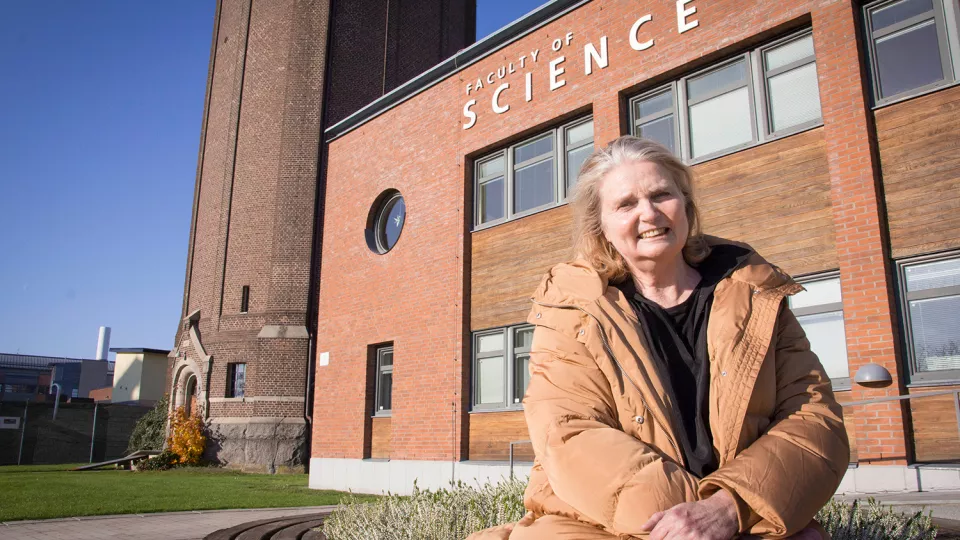The afternoon sun floods in through the windows from Sölvegatan and is reflected on Karin Hall’s computer screen. The deputy dean for first and second cycle education at the Faculty of Science and professor at the Department of Physical Geography and Ecosystem Science (INES) takes a deep sip of coffee. She has just concluded a digital meeting with one of her Master’s students, who is investigating how the mussel population in the Mediterranean will be affected by future climate change. It is Friday. But not just any old Friday. It is the last working day under Covid-19 restrictions. Karin Hall leans back and recalls those confusing days in March last year, when one of the faculty’s students fell ill with Covid-19 and the University switched to distance learning.
‟Everything went so fast there in the beginning. It was stressful, and we were forced to take a lot of decisions on the spot. The digital transition got off to a flying start, which would never have happened if we hadn’t been forced into it”, says Karin Hall.
Laughter can be heard from the faculty entrance hall. A group of astronomy students is sitting around a table discussing a take-home assignment among coffee cups, sandwiches wrapped in plastic and stacks of books. After 18 months, their chatter is once again part of everyday life.
I was worried that the social isolation would negatively impact study results. But statistics show that the students actually managed their courses as well as previously. However, we now see the spread of infection increasing again, so it is important not to cry victory prematurely, says Karin Hall.
It was not only the students who were forced to grapple suddenly and comically with faulty headsets, flaky internet connections and treacherous mute-buttons on Zoom. Staff at the departments had to shoulder a heavy load.
‟Teaching in normal circumstances is like running in front of an accelerating train, despite doing what we can to cut down on reporting requirements and administration. The transition placed a lot of pressure on many people. But today, I am incredibly impressed and grateful for how well teaching staff and students dealt with it all”, she says.
So how will the pandemic affect first and second cycle education in the next few years? Karin Hall is convinced that the technical and communications gains that were made will be advanced and developed further. Mixed learning environments – blended learning – are already making inroads on a broad front. But the transition is not only a question of digital communication tools such as Teams and Zoom. According to Hall, it is also about improving your digital learning skills and using the digital possibilities in teaching practice.
Our remit includes educating students to be capable of critically reviewing the world around them. As the world becomes more digitalised, it is important to be able to relate to digital data and digital information. It is a matter of democracy. I want all students to have the opportunity to develop knowledge in the digital field on the basis of their own subject areas, says Karin Hall.
The University is currently working on the thematic areas of ‟widening participation” and ‟lifelong learning” set by the government. These themes will most probably be present for several years to come. But what other themes might become relevant? In Karin Hall’s crystal ball are targeted initiatives on everything from artificial intelligence (AI), data analysis and computational science to environment and climate issues.
“If I were to make a prediction about future university teaching staff, I would say they will probably have more comprehensive training in teaching and learning to meet future expectations of higher education. Expectations will certainly also rise in terms of intertwining and how we collaborate with wider society in education”, she says.
The research landscape is a concept that sometimes arises in public debate. Karin Hall is also calling for a discussion on the landscape of first and second cycle education. Despite this landscape historically being more static, she believes that, in future, it will be more dynamic with more targeted additional initiatives.
In future, our direct government funding may only constitute part of the financing of our first and second cycle education. We must be prepared for a lot of change, says Karin Hall.
Another initiative that Karin Hall believes will strengthen first and second cycle education at the Faculty of Science consists of plans for closer collaboration between the Department of Biology, the Centre for Environmental and Climate Science (CEC), the Department of Physical Geography and Ecosystem Science (INES) and the Department of Geology. This collaboration, referred to as BioCIG, is a wise way of planning for the future, in Hall’s view.
“We have to sharpen our collective profile in the environment and climate field. I would like to see a departmental merger. The faculty’s establishment in Brunnshög entails new opportunities for development at Sölvegatan”, says Karin Hall.
But INES and geology moved in together in 2010 only to separate the year after. What makes you think this attempt at loving cohabitation would succeed this time around?
“I was assistant head of the merged department and I don’t think the time was ripe for it then. Now it has become clear that the departments would have benefited from deeper collaboration. I see great development potential for first and second cycle education. Imagine what collective strength we would have gained”, says Karin Hall.
Text and photo: Johan Joelsson.
